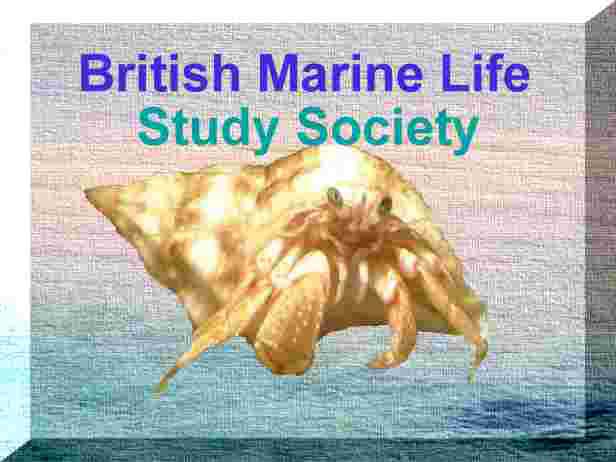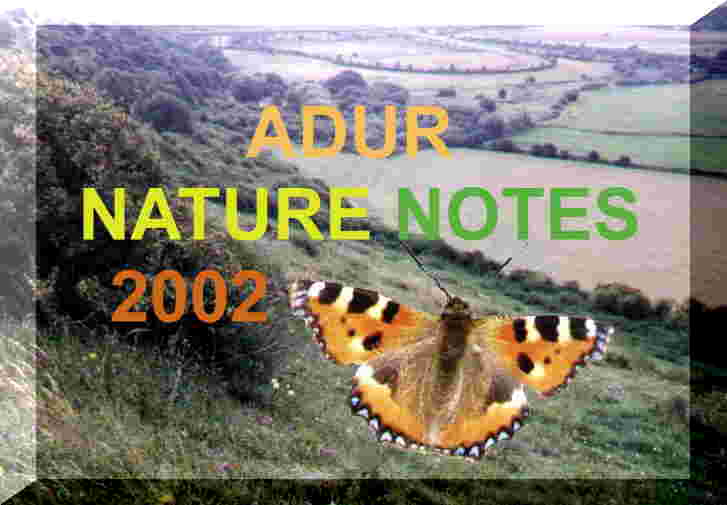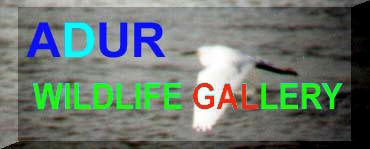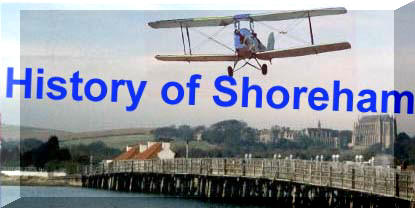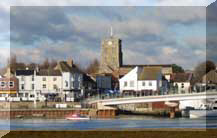
|
NEWS BULLETIN FOR THE ADUR VALLEY |
| LOCAL
ORGANISATIONS |
| LOCAL RESIDENTS PAGE |
| Adur Flood Plain |
| Chalk Downs |
| Coastal Fringe |
| Intertidal (Seashore) |
| Nature
Notes for
Lancing Ring |
| River Adur Estuary |
| River Adur |
| Sea (off Sussex) |
| Town & Gardens |
| Widewater Lagoon |
| AREA MAP |
| Shermanbury (Adur Valley) |
| WSCC LIBRARY |
|
|

This is the first published
Electronic Newspaper for
Shoreham-by-Sea and the
Adur Valley & District, West Sussex, England
Local News24 January 2002
A Public Meeting is being held at the Lancing Parish Hall on 24th January
2002. Time : 7:00 pm
The purpose is to discuss with the Environment Agency the effect shingle movement is having on water levels in Widewater Lagoon.Information from Ray Hamblett & Councillor Tony Nicklen
State of the District Debate Discussion Groups
Date: Saturday 26 January 2002
Venue: Shoreham Centre, Pond Road, Shoreham
Time: 09:00
Duration: 4 Hours
Description: Discussion Groups Organised by Adur District Council starts 9:30 am Pre-booking event.Booking: Adur District Council (Anna Mutter) Tel: 01273 263251
The West Sussex Structure Plan 2001-2016
The Structure Plan Deposit Draft
Once the new West Sussex Structure Plan is published it will be known as the "Deposit Draft" because the Plan will be "deposited" in the public domain for a period of 6 weeks.http://www.westsussex.gov.uk/PL/splan/sp2002/splan.htm
Remember only representations received during the official period which runs
from 4th January to 15th February 2002 will be considered by the Inquiry Panel.West Sussex Highways & Transport
http://www.westsussex.gov.uk/HT/hthome.htm
Weather Forecast
Please send any comments to: Andy Horton
Glaucus@hotmail.com
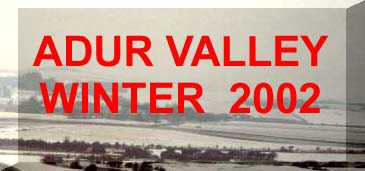 |
 |
 |
 |
Wildlife Notes
18 January 2002
A Great Tit was many of bird visitors (1 Great Tit, 1 Blue Tit, both singing loudly, 1 Robin, 4 Greenfinches, 4 Sparrows, 1 Blackbird, feeding on black sunflower and bird table mix) in my Lancing garden. A Song Thrush comes in sometimes.Report by Ray Hamblett
14 January 2002
On the estuarine Adur mudflats, thousands (about 2500) of Lapwings exceeded any numbers I had noted before and they were on all the exposed mud on both sides of the river, with the greatest numbers near the Toll Bridge. When disturbed by the helicopter their "peewit" calls were most noticeable. A few, at least two, Grey Plovers searched for invertebrates on the mud.
A flock of about a dozen Feral Pigeons seem to have settled on the houses in Buckingham Road immediately north of Shoreham station. This has been included just in case this is the start of a permanent invasion rather than just a temporary excursion from their normal haunts. There have always been a few Pigeons around Shoreham-by-Sea railway station, but unlike Southwick where they inhabit the Square, Shoreham has been spared these nuisance birds.
By 18 February 2002, the Herring Gulls, themselves relatively recent town immigrants in any numbers, seemed to have chased off the the Pigeons.12 January 2002
A Jay could be clearly seen in the denuded broadleaf branches in Church Lane, Southwick, near the vicarage of St. Michael's Church; a common enough sight in this side road, but will it remain so if ever the wood in this road is developed?11 January 2002
The low spring tide at Kingston Beach only receded to 1.2 metres above Chart Datum so the lowest most interesting part of this beach was still under water. However, despite this and January is usually the least interesting of all the months of the year, there were still small Blennies under rocks, a tiny 6 mm Butterfish and a few prawns, Palaemon elegans, in the pools underneath the groynes.The most notable discovery were large Dogwhelks averaging 50 mm in length (all a dirty white colour) and one group were laying their egg capsules. Unusually, small Common Starfish were present under rocks and at least one Common Whelk was discovered amongst the oysters.
Full Report
Dogwhelk page
Trouble with DogwhelksA Fox brazenly trotted from one twitten to another across Gordon Road, Shoreham, right in the middle of a residential area and very near where I was brought up in Rosslyn Road. This is an area of terraced houses and narrow smallish gardens, although there is some waste land next to the railway line. The Fox looked healthy and very grey, although at 10:00 pm and it was only lit up by the street lamps and colours were not bright. Foxes have been seen frequently in town.
10 January 2002
The River Adur estuary between the Norfolk bridge and the A27 Flyover sported a particular large number of sea birds as the low spring tide receded exposing the mud flats north of the Railway Viaduct and the mussel beds and gravel to the south. Nothing special although the large stumpy wader known as the Knot (x2) made sudden darts to capture its food. In order of prevalence the bird selection with over a hundred birds included Lapwings, Black-headed Gulls, Dunlins and Black-backed Gulls. There were significant numbers of Redshanks, Oystercatchers, Herring Gulls, Common Gulls, and a few Mute Swans. A large Little Egret fished in a pool by the viaduct, and a Ringed Plover could be picked out from the gravel. On the vegetated mudflats by the houseboats, seven Grey Herons stood statuesquely. Crows foraged around the smaller boats by the Norfolk bridge and on the towpath adjacent to the airport. The absence of Cormorants was not an omission. There were none to be seen.7 January 2002
A small chirm of four or more adult Goldfinches made an attractive addition on the fence of the playing fields to the west of the Church Green estate, Middle Road, Shoreham.6 January 2002
52 Pochards were recorded by Colin Upton (Brighton RSPB) leading a group of birdwatchers at Widewater Lagoon. These ducks were also reported before Christmas at Widewater.Report on Sussex Ornithological News
ADUR VALLEY NATURE NOTES 2001 WINTER Nature Notes 2001 JANUARY - MARCH SPRING Nature Notes 2001 APRIL - JUNE SUMMER Nature Notes 2001 JULY - SEPTEMBER AUTUMN Nature Notes 2001 OCTOBER - DECEMBER
Lancing Nature & History - December 2001 Newsletter
Lancing Ring Photographic Gallery for October
Poem or LiteratureVisions of Johanna
In the empty lot where the ladies play blindman's bluff with the key chain
And the all-night girls they whisper of escapades out on the "D" train
We can hear the night watchman click his flashlight
Ask himself if it's him or them that's really insane
Louise, she's all right, she's just near
She's delicate and seems like the mirror
But she just makes it all too concise and too clear
That Johanna's not here
The ghost of 'lectricity howls in the bones of her face
Where these visions of Johanna have now taken my placeBob Dylan 1966 [extract]
Bob Dylan went electric about the same time as the steam locomotive went out on British Railways.
from the album "Blood on the Tracks"
They sat together in the park
As the evening sky grew dark,
She looked at him and he felt a spark tingle to his bones.
'Twas then he felt alone and wished that he'd gone straight
And watched out for a simple twist of fate.They walked along by the old canal
A little confused, I remember well
And stopped into a strange hotel with a neon burnin' bright.
He felt the heat of the night hit him like a freight train
Moving with a simple twist of fate.Bob Dylan will be on at the Brighton Centre soon and the tickets are currently on sale.
- British
Web Sites
Dragonflies
of the Hampshire & Surrey Borders
Flight
Times (First Seen)
- Historical
Snippets
Shoreham
to Horsham Branch Line
Important Chronology (incomplete):
| 25 January 1837 | Main rail route from London to Brighton undecided. Robert Stephenson proposed the route via Shoreham, Henfield and Horsham. |
| 15 July 1837 | Main rail route from London to Brighton decided on current direct route. |
| 11 May 1840 | Branch line
from Brighton to Shoreham opened
Brighton - Hove - Portslade - Southwick - Kingston - Shoreham. |
| July 1841 | Kingston wharf sidings connect Shoreham Harbour to the main line. |
| 21 September 1841 | London to Brighton railway opened. |
| 24 November 1845 | Railway extended to Worthing with a wooden trestle bridge over the River Adur. The railway line reached Chichester on 8 June 1846 and Portsmouth on 14 June 1847. |
| 15 December 1857 | Two rival groups met at separate venues to discuss their proposals for a rail route through the Adur Valley. |
| 12 July 1858 | London, Brighton & South Coast Railway proposals authorised by Parliament. |
| 1 July 1861 | Line from
Shoreham to Partridge Green opened.
Shoreham - Bramber - Steyning - Henfield - Partridge Green. |
| 16 September 1861 | Line completed
to link to the main line to Horsham.
Partridge Green - West Grinstead - Southwater - Christ's Hospital - Horsham. |
| 1879 | Double track constructed on the branch line. |
| 1926 | Decline of railway branch lines everywhere with the reduction of the important Southwater brick trade on this line. (A later photograph shows coal and brick wagons in 1958.) |
| 1961-2 | Freight services at stations on-route, including Steyning market are withdrawn. |
| 3 May 1964 | Last steam
hauled regular train.
Replaced by diesel multiple units. |
| 15 June 1964 | Brighton and Horsham Engine Sheds close down. |
| 5 December 1965 | Scheduled date for closure. |
| 6 March 1966 | Branch line closed completely for all traffic, except for the short spur serving Shoreham Cement Works. |
| August 1966 | Track lifting and demolition commenced. |
| 1968 | The freight sidings to the wharf at Kingston closed. Shoreham sidings closed in 1965. |
| 1969 | Stations on the branch lines begin to be demolished. |
| May 1980 | Cement Works closed to rail traffic. Last weekly trip with gypsum to the works arrived on 21 April 1980. |
| Track lifted to Beeding Cement Works. |
NEW BOOK AND VIDEO
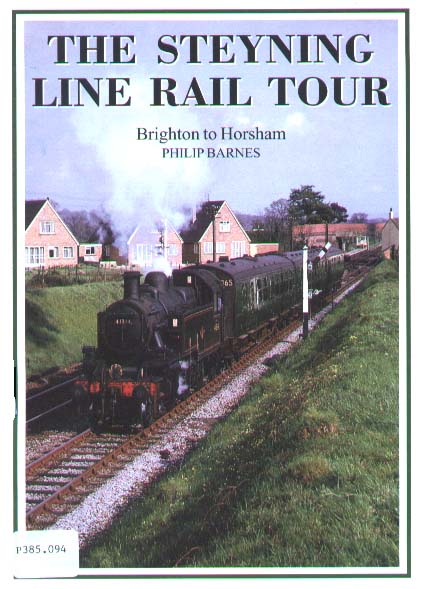 THE
STEYNING LINE RAIL TOUR
THE
STEYNING LINE RAIL TOUR
Brighton
to Horsham
Philip
Barnes
Photographs by various contributors including Gerald Daniels.
Publisher
N/K
ISBN
N/K
Extract:
This
new booklet, surprisingly the first publication to be solely devoted to
the branch line describes a journey that would have been commonplace on
the branch in the last years before steam vanished. Using unique and rare
photographs from the 1960's, the booklet has 32 pages comprehensively illustrated
with good quality previously unpublished photographs and a full colour
cover (see home page).
Opened fully on Monday 16 September 1861 the 17 mile (27 km) line served the developing villages and communities along the Adur valley of West Sussex, England. Built during the golden age of railway building, all the stations were substantial structures and within years of opening the line was doubled from its original single-track formation. As a branch line it served the local communities well taking them effortlessly to the larger towns of Shoreham-by-Sea and Steyning in the south or Horsham to the north.
The booklet contains 32 pages and monochrome photographs.
Click on the book illustration to find the interesting web page.
The chronology above was constructed before I read this book. However, the entries for 1926, 19654 and 1965 were amended as a result of the book, which may not include all the above information. I had seen a few of the photographs before.
Adur Valley Book List
- Words
of the Week
egregious
| rids | a. M16. [f. L egregius surpassing, illustrious, f. e- E-
+ greg-, grex flock: see -IOUS.] 1 Remarkably good; outstanding, striking;
distinguished, excellent. Now rare. M16. 2 Remarkable in a bad sense; gross,
flagrant; shocking. L16. 3 Prominent, protruding. rare. L16.
2
N. PEVSNER Pages 122-3 are a masterpiece of egregious diddling. C. P. SNOW
The most egregious man who had ever been awarded fifteen honorary degrees.
egregiously
adv. M16. egregiousness n. E17.
chthonic | kthnk | a. L19. [f. Gk khthon earth + -IC.] Dwelling in or beneath the earth or in the underworld; of or pertaining to the underworld.
pretzel | prets()l | n. Also (now rare or obs.) bretzel | brets()l | . M19. [G.] A hard salted biscuit usu. in the form of a knot, eaten orig. in Germany.
---------------------------------------------------------
Excerpted
from The Oxford Interactive Encyclopedia
Developed
by The Learning Company, Inc. Copyright (c) 1997 TLC Properties Inc.
Image Gallery
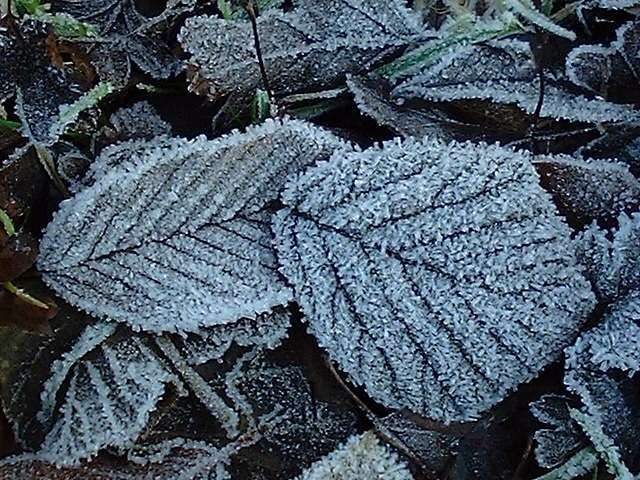
Frosty Leaf
Photograph
by Ray Hamblett
- Tucows
Software Reviews

|
Web
Monkey :
The Web Developer's Resource
Location:
http://hotwired.lycos.com/webmonkey/
Digital
Photography Review
http://www.dpreview.com/
The default files created
have the suffix *.html so anybody using the program has to be a little
bit cautious about overwriting existing files.
Computing
Net Support Site
(for computing problems) ****
http://computing.net/windows95/wwwboard/wwwboard.html
The upsurge of EFora
on all subjects (a
few have been recommended before in these bulletins) are an important way
in which the Internet
will change the world.
A list of recommended eFora
are shown in the left hand column. Please make any suggestions.
Sussex History PASTFINDERS
Archaeology in Sussex to AD 1500 ****
WSCC
LIBRARY *****
Excellent
and essential service with a full catalogue of books, CDs, videos, on-line
renewals, book ordering.
- The
Glaucus 2000 CD-ROM includes the complete Shoreham-by-Sea
and Adur Valley web sites, as well as shareware
and free programs

ADUR VALLEY EFORUM PAGE |
Events24 January 2002
A Public Meeting is being held at the Lancing Parish Hall on 24th January 2002. Time : 7:00 pm
The purpose is to discuss with the Environment Agency the effect shingle movement is having on water levels in Widewater Lagoon.
- Information
from Ray Hamblett
& Councillor Tony Nicklen
State
of the District Debate Discussion Groups
Date:
Saturday
26 January 2002
Venue:
Shoreham Centre, Pond Road, Shoreham
Time:
09:00
Duration:
4 Hours
Description:
Discussion Groups Organised by Adur District Council starts
9:30 am Pre-booking event.
Farmer's Market
Fresh
produce
East
Street, Shoreham-by-Sea
South Downs National Park : Proposed Area
On
27
November 2001, the Countryside Agency
will be starting a public consultation on the designation of a National
Park for the South Downs.
South
Downs National Park Proposals: Maps
http://www.countryside.gov.uk/proposednationalparks/sd_boundaryintro.asp
http://www.countryside.gov.uk/proposednationalparks/sd_boundaryintroEast.asp
(the
detailed maps do NOT seem to work)
Clearest
Map (but not detailed enough)
http://www.countryside.gov.uk/proposednationalparks/sd_draftboundary.htm
Worth
looking at:
South
Downs Landscape Character Area Map
http://www.countryside.gov.uk/proposednationalparks/sd_lca.htm
The Countryside Agency is
to hold a series of road shows to get feedback on the South Downs National
Park proposals. Provisional details are:
Mon 14th Jan, The Steyning Centre, Steyning 11.00 - 18.00
Sat
2nd Feb, The Shoreham Centre 11.30 - 15.30
Please consult the Countryside Agency website http://www.countryside.gov.uk/proposednationalparks for latest info
Click on the URL for the complete map.
- Adur
On-line Events page
- http://appspace.nexus-solutions.net/arc/asp/diary/diaryoutput.asp
- Please send in any details of local events.
- Web
Sites
American
Heritage Dictionary of the English Language:
Fourth
Edition *****
- SPONSORSHIP OPPORTUNITY
For any company or organisation wanting nationwide green publicity, there is an opportunity to sponsor the journal "Glaucus" of the British Marine Life Study Society.
There remains sponsorship opportunities on the BMLSS (England) web site and other publications, including Torpedo.
Sponsorship is also available for the Adur Torpedo Electronic News Bulletin and the Shoreham-by-Sea web pages (which preceded the Adur Resource Centre web site), which would be more suitable for a local firm(s).
Web Site Design Services are available from Hulkesmouth Publishing
Normal
advertisement rules apply.
Submissions
accepted by EMail only.
|
|
|
|
| 1 | 101 | State of the District Debate Discussion Groups |
Adur
Torpedo was written, designed and distributed by Andy
Horton.

